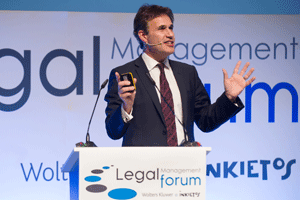
"The legal profession will change more in 10 years than in the last century"
The legal guru, Richard Susskind, announces a future in which the legal sector must lose its fear of using new technologies and deepen the standardization of some services.
"In the next ten years, the impact of technology will bring more changes to the legal profession than those observed in the sector in the last century." This is one of the predictions of the great lawyer guru, Richard Susskind, who believes that legal professionals have to strive to anticipate the market and leave behind their "irrational rejection of the use of new technologies."
The Oxford professor, international lecturer and author of books on the future of the legal profession, described last Tuesday in Madrid the current panorama of the legal profession as a market in which companies are reducing the costs of external lawyers and cutting the number of its own lawyers, at the same time that regulatory complexity is increasing.
For this reason, he highlighted that the challenge will be to "bet on a collaborative strategy that reduces costs and improves efficiency", studying what issues can be outsourced, as well as the possibility of eliminating those tasks for which lawyers are overprepared, standardizing functions. more basic and assigning them to support staff, or what is known in the sector as paralegal. He delivered all of these visions about the future of the profession at the closing of the Legal Management Forum 2014, organized by Wolters Kluwer and Inkietos.
Clues for the future
– It is not enough to offer a good price to customers. They also seek effectiveness and predictivity. – Firms expect lawyers not only to have legal knowledge, but also to generate business.
– Lawyers must show their efficiency in tasks that non-legal groups can already do.
Susskind pointed out that we must find a way to "disaggregate" each piece of the legal service to manage it individually in a much more effective way. “Companies don't care so much about paying more for work that provides added value, but not for something that junior lawyers can do,” insisted Susskind, who invited the large audience of lawyers listening to him to ask themselves the following questions: "For what problem are you the solution? What is the fundamental value that you provide as a lawyer? How do you convert your knowledge into added value for the client?"
In the same line as Susskind, Stacey Caywood, CEO of the division of Legal & Regulatory of Wolters Kluwer, pointed out some trends that are being detected in the legal sector, such as the increase in the use of services from non-strictly legal firms, for example for the most administrative part of work: «Law firms will be able to play a role in this context only if they are flexible enough in the adaptation of their structures," he noted.
ChangesIn all this new and complex panorama that is being configured for the legal market, we must add one more factor: the new billing models that, largely as a result of the crisis, are undergoing changes. This was also a recurring theme during the legal forum held in Madrid and about which experts from inside and outside our borders spoke, delving into the need to search for innovative models in the payment of fees, leaving aside the already obsolete charge for fees. hours.
However, it will be the emergence of new technologies that represents the greatest challenge for lawyers of the future, with the development of cognitive technology and artificial intelligence systems such as IBM's Watson project, with which a machine can now respond to queries complex legal.
Fountain: www.expansion.com



